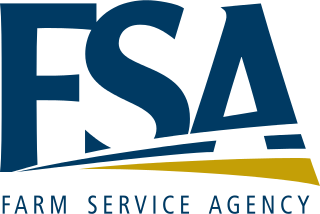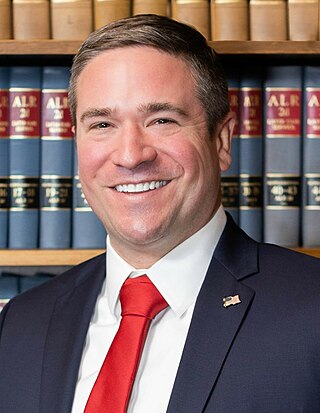
Agritourism or agrotourism involves any agriculturally based operation or activity that brings visitors to a farm or ranch.

The United States Department of Agriculture (USDA) is an executive department of the United States federal government that aims to meet the needs of commercial farming and livestock food production, promotes agricultural trade and production, works to assure food safety, protects natural resources, fosters rural communities and works to end hunger in the United States and internationally. It is headed by the secretary of agriculture, who reports directly to the president of the United States and is a member of the president's Cabinet. The current secretary is Tom Vilsack, who has served since February 24, 2021.

The Farm Service Agency (FSA) is the United States Department of Agriculture agency that was formed by merging the farm loan portfolio and staff of the Farmers Home Administration (FmHA) and the Agricultural Stabilization and Conservation Service (ASCS). The Farm Service Agency implements agricultural policy, administers credit and loan programs, and manages conservation, commodity, disaster, and farm marketing programs through a national network of offices. The Administrator of FSA reports to the Under Secretary of Agriculture for Farm Production and Conservation. The current administrator is Zach Ducheneaux. The FSA of each state is led by a politically appointed State Executive Director (SED).
In American law, the American Law Reports are a resource used by American lawyers to find a variety of sources relating to specific legal rules, doctrines, or principles. It has been published since 1919, originally by Lawyers Cooperative Publishing, and currently by West and remains an important tool for legal research.
The United States National Agricultural Library (NAL) is one of the world's largest agricultural research libraries, and serves as a national library of the United States and as the library of the United States Department of Agriculture. Located in Beltsville, Maryland, it is one of five national libraries of the United States. It is also the coordinator for the Agriculture Network Information Center (AgNIC), a national network of state land-grant institutions and coordinator for the U.S. Department of Agriculture (USDA) field libraries.

The Animal Welfare Act was signed into law by President Lyndon B. Johnson on August 24, 1966. It is the main federal law in the United States that regulates the treatment of animals in research and exhibition. Other laws, policies, and guidelines may include additional species coverage or specifications for animal care and use, but all refer to the Animal Welfare Act as the minimally acceptable standard for animal treatment and care. The USDA and APHIS oversee the AWA and the House and Senate Agriculture Committees have primary legislative jurisdiction over the Act. Animals covered under this Act include any live or dead cat, dog, hamster, rabbit, nonhuman primate, guinea pig, and any other warm-blooded animal determined by the Secretary of Agriculture for research, pet use or exhibition. Excluded from the Act are birds, rats of the genus Rattus, mice of the genus Mus, farm animals, and all cold-blooded animals.

HeinOnline (HOL) is a commercial internet database service launched in 2000 by William S. Hein & Co., Inc., a Buffalo, New York publisher specializing in legal materials. The company began in Buffalo, New York, in 1961, and is currently based in nearby Getzville, NY. In 2013, WSH Co. was the 33rd largest private company in western New York, with revenues of around $33 million and more than seventy employees.

Law reports or reporters are series of books that contain judicial opinions from a selection of case law decided by courts. When a particular judicial opinion is referenced, the law report series in which the opinion is printed will determine the case citation format.
In the United States, a commodity checkoff program promotes and provides research and information for a particular agricultural commodity without reference to specific producers or brands. It collects funds through a checkoff mechanism that is sometimes called checkoff dollars, from producers of a particular agricultural commodity and uses these funds to promote and do research on that particular commodity. As stated earlier the organizations must promote their commodity in a generic way without reference to a particular producer. Checkoff programs attempt to improve the market position of the covered commodity by expanding markets, increasing demand, and developing new uses and markets. Checkoff programs amount to $750 million per year.

The Legal Information Institute (LII) is a non-profit public service of Cornell Law School that provides no-cost access to current American and international legal research sources online. Founded in 1992 by Peter Martin and Tom Bruce, LII was the first law site developed on the internet. LII electronically publishes on the Web the U.S. Code, U.S. Supreme Court opinions, Uniform Commercial Code, the US Code of Federal Regulations, several Federal Rules, and a variety of other American primary law materials. LII also provides access to other national and international sources, such as treaties and United Nations materials. According to its website, the LII serves over 40 million unique visitors per year.

San Joaquin College of Law (SJCL) is a private law school in Clovis, California.
These organizations for higher education have a common purpose and mission for advocacy in numerous areas of both institutional management and the general public interest. The organizations have specific purpose for issues from faculty unionization to public policy research and service to institutions. Most are focused on the organization and governance of higher and tertiary education, but some are involved in service and research at all levels of education.

The Office of the Missouri Attorney General was created in 1806 when Missouri was part of the Louisiana Territory. Missouri's first Constitution in 1820 provided for an appointed attorney general, but since the 1865 Constitution, the Attorney General has been elected. As of January 2023, there have been 44 attorneys general in Missouri.
Legal research is the process of identifying and retrieving information to support legal arguments and decisions. Finding relevant legal information can be challenging and may involve the use of electronic research tools as well as printed books and materials. However, many resources that are useful for legal research are fee-based, and many are not easily accessible.

The Environmental Law Institute (ELI) is a non-profit, non-partisan organization, headquartered in Washington, D.C., that seeks to "make law work for people, places, and the planet" through its work as an environmental law educator, convener, publisher, and research engine. ELI's primary audience includes legal practitioners, business leaders, land managers, land use planners, environmentalists, journalists, and lawmakers. The Institute also convenes conferences to promote the exchange of ideas; holds seminars to educate legal practitioners and business leaders; and publishes original research, both as monographs and in its periodicals, the Environmental Law Reporter and The Environmental Forum.
Computer-assisted legal research (CALR) or computer-based legal research is a mode of legal research that uses databases of court opinions, statutes, court documents, and secondary material. Electronic databases make large bodies of case law easily available. Databases also have additional benefits, such as Boolean searches, evaluating case authority, organizing cases by topic, and providing links to cited material. Databases are available through paid subscription or for free.
Consumer protection is the practice of safeguarding buyers of goods and services, and the public, against unfair practices in the marketplace. Consumer protection measures are often established by law. Such laws are intended to prevent businesses from engaging in fraud or specified unfair practices to gain an advantage over competitors or to mislead consumers. They may also provide additional protection for the general public which may be impacted by a product even when they are not the direct purchaser or consumer of that product. For example, government regulations may require businesses to disclose detailed information about their products—particularly in areas where public health or safety is an issue, such as with food or automobiles.
The Child Welfare Information Gateway is the congressionally mandated and funded information service of the United States Children's Bureau, Administration for Children and Families, United States Department of Health and Human Services. It was established in 2006 to replace the National Clearinghouse on Child Abuse and Neglect Information and the National Adoption Information Clearinghouse. The Child Welfare Information Gateway covers child-welfare topics, including family-centered practice, child abuse and neglect, abuse and neglect prevention, child protection, family preservation and support, foster care, achieving and maintaining permanency, adoption, management of child welfare agencies and related topics such as child and family assessment, laws and policies, statistics and coincident family issues. Its website links to sources of print and electronic publications, websites, databases and online learning tools on these topics.
A presidential directive, or executive action, is a written or oral instruction or declaration issued by the president of the United States, which may draw upon the powers vested in the president by the U.S. Constitution, statutory law, or, in certain cases, congressional and judicial acquiescence. Such directives, which have been issued since the earliest days of the federal government, have become known by various names, and some have prescribed forms and purposes. Presidential directives remain in effect until they are revoked, which the president is free to do. The classification of presidential directives is not easily done, as the distinction between the types can be quite arbitrary, arising from convenience and bureaucratic evolution, and none are defined in the Constitution. Furthermore, the different types may overlap. As one legal scholar put it: "it is a bit misleading to overclassify presidential directives as comprising separate and distinct 'types' just because they have different headings at the top of the first page." In terms of legal applicability, what matters is the substance of the directive, not the form, unless a certain kind of directive is specifically required by relevant statute.

The 2018 farm bill or Agriculture Improvement Act of 2018 is an enacted United States farm bill that reauthorized $867 billion for many expenditures approved in the prior farm bill. The bill was passed by the Senate and House on December 11 and 12, 2018, respectively. On December 20, 2018, it was signed into law by President Donald Trump.










